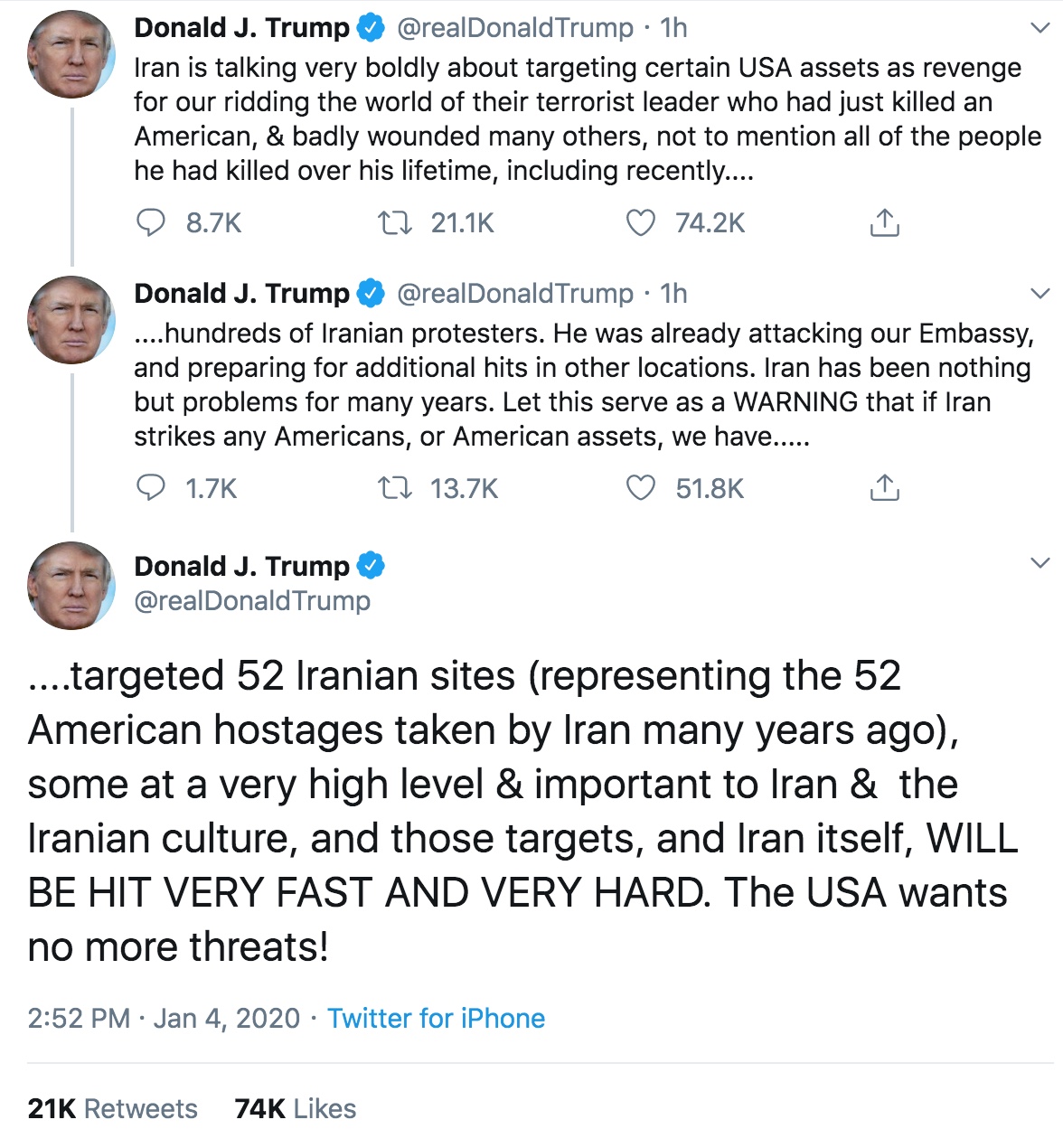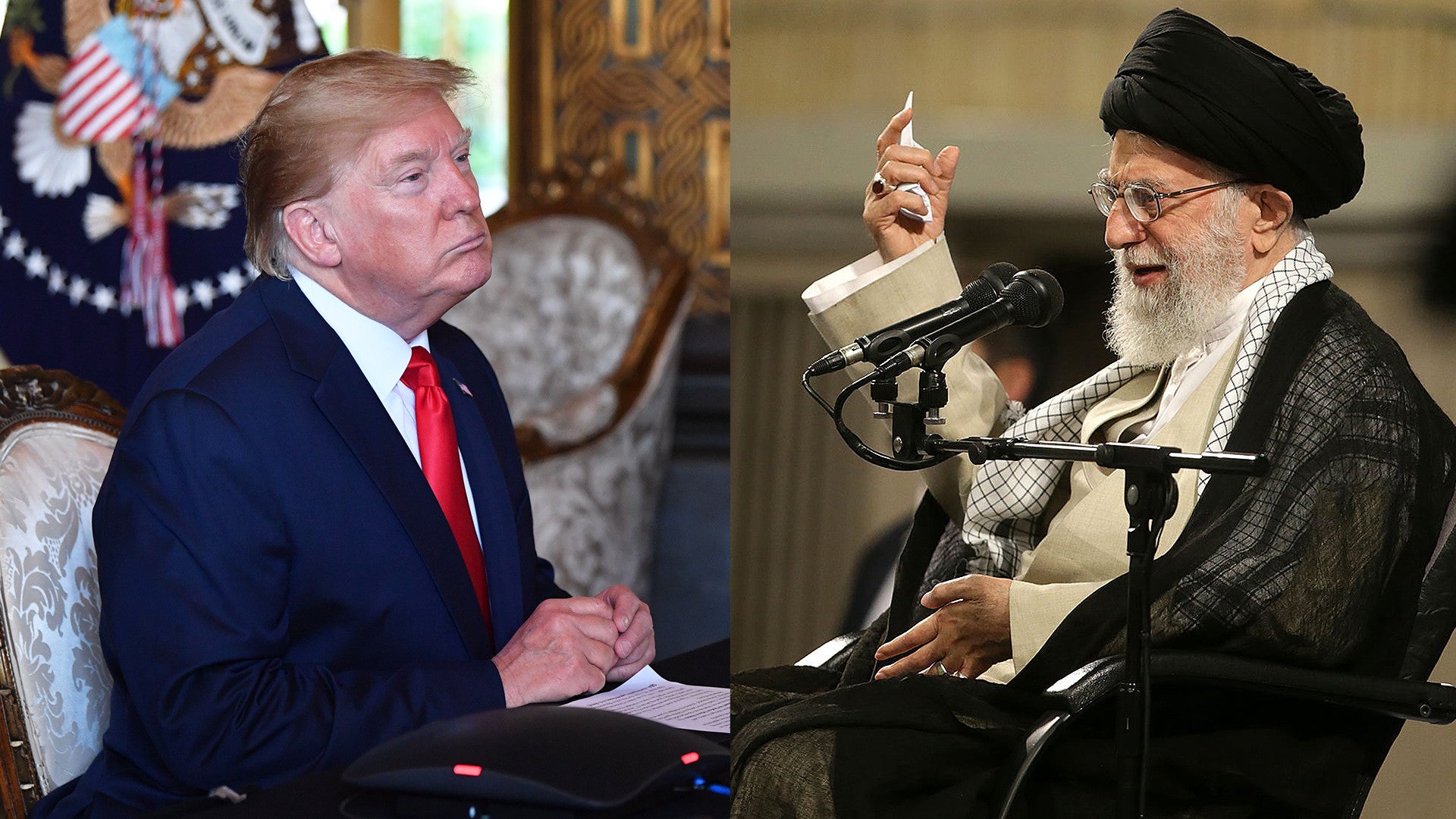Since the targeted assassination of Iranian Quds Force commander Qasem Soleimani just two days ago, the rhetoric between Washington D.C. and Tehran has taken a massive turn for the worse. Now, with Iran indicating that it is looking to exact a major toll on the U.S. over Soleimani’s death in the coming days and weeks, U.S. President Donald Trump has drawn a red line that will be nearly impossible to step back from if the Iranians do decide to act.
In a series of tweets, Trump laid out his retaliatory plan as a warning to the Iranian regime:
Iran is talking very boldly about targeting certain USA assets as revenge for our ridding the world of their terrorist leader who had just killed an American, & badly wounded many others, not to mention all of the people he had killed over his lifetime, including recently….
….hundreds of Iranian protesters. He was already attacking our Embassy, and preparing for additional hits in other locations. Iran has been nothing but problems for many years. Let this serve as a WARNING that if Iran strikes any Americans, or American assets, we have…..
….targeted 52 Iranian sites (representing the 52 American hostages taken by Iran many years ago), some at a very high level & important to Iran & the Iranian culture, and those targets, and Iran itself, WILL BE HIT VERY FAST AND VERY HARD. The USA wants no more threats!

The message adopts a tone similar to what we hear from actors such as Iran when it references symbology with the targeting plan and the inclusion of cultural sites that are important to the Iranian people, which are symbolic by there very nature. It is important to note that what Trump is describing could be a war crime, depending on the exact nature of the targets he is talking about. Deliberately striking targets with no military value is prohibited under the Geneva Conventions. At the same time, his message puts forward a crystal clear warning as to what will result from any significant reprisal.
Regardless, some will cheer this as being as tough as possible on Iran and talking in terms of strength that some say is the only language they understand. At the same time, it does set up an inflexible situation that would likely lead to an all-out war if Iran forces Trump’s hand. In other words, we are in the realm of brinksmanship of the highest level now.
Trump’s comments follow threats from Iranian officials, as well as Iranian-proxies in Iraq and elsewhere in the Middle East, in the aftermath of Soleimani’s death. “His departure to God does not end his path or his mission, but a forceful revenge awaits the criminals who have his blood and the blood of the other martyrs last night on their hands,” the Ayatollah Ali Khamenei, Iran’s Supreme Leader, had said in a statement yesterday.
The U.S. decision to kill the Quds Force commander “will trigger a strategic revenge response that will definitely end U.S. presence in the region,” Hossein Salami, commander of Iran’s Islamic Revolutionary Guard Corps (IRGC), of which the Quds Force is a part, said earlier today. Members of the IRGC also raised a red flag, symbolizing the promise to avenge Soleimani’s killing, in place of the usual blue one, over the Jamkaran Mosque in the Iranian city of Qom, an immensely holy site in Shia Islam.
It remains unclear where and when that response might come, and in what form, something The War Zone
has talked about at length in our previous reporting on this crisis. Trouble is certainly brewing in Iraq itself, with Kata’ib Hezbollah, the Iranian-backed militia group, warning Iraqi security forces to stay away from any bases they share with American forces starting tomorrow night, with the obvious implication that they plan to strike these facilities targets in some fashion.
Kata’ib Hezbollah is at the center of the present crisis. The group being responsible for a string of recent rocket attacks on Iraqi bases hosting American troops, one of which killed one American contractor last month, as well as a mob attack on the U.S. Embassy in Baghdad. These events prompted series of American responses, including the strike that killed Soleimani, as well as Kata’ib Hezbollah chief Abu Mahdi al Muhandis.
This same Iranian-supported militia, which technically operates under the auspices of the Iraqi government’s Popular Mobilization Forces, has also threatened to publish the name and address of any Iraqi parliamentarians who do not vote in favor of legislation to eject the U.S. military from Iraq, an implicit death threat. Iraqi lawmakers are due to take up legislation to this effect in the coming days. There are already reports that Iraqi authorities have imposed restrictions on the movement of American personnel, but it is unclear the extent of those measures or how they have been implemented.
With both Soleimani and Muhandis dead, and with the United States increasingly appearing to be conducting an active campaign targeting Islamic Revolutionary Guard Corps members and Iranian proxies in Iraq and elsewhere in the region, it is also increasingly possible that any response will be at least partially distributed in nature, with various groups acting with minimal coordination or entirely independently. A number of notably Iraqi militants were absent from a joint public funeral for the Quds Force commander and head of Kata’ib Hezbollah in Iraq today, potentially due to concerns for their safety.
Kata’ib Hezbollah’s ultimatum also came amid rocket attacks near the U.S. Embassy and Balad Air Base, which is situated some 40 miles to the north of Baghdad and where a relatively small number of American military personnel are based. There were no U.S. casualties from either attack, but there were civilian casualties from the rockets that fell near the Embassy and members of Iraq’s security forces were wounded by the rockets that struck Balad.
Tensions have been running high in Baghdad and elsewhere in Iraq all day. During the funeral for Soleimani and Muhandis, a fistfight reportedly broke out between Iraqi militia members and members of the country’s Counter-Terrorism Service (CTS), an elite, predominantly U.S.-trained force that has long been described as the country’s most capable and politically reliable.
All told, the situation is extremely fluid. Iraqi Prime Minister Adil Abdul-Mahdi has declared three days of mourning for the “martyrs” and Soleimani’s body is now headed back to Iran for a state funeral that will coincide with the end of three days of mourning over his death there.
We will continue to update this story as more information becomes available.
UPDATE: 1/5/2020
Iraq’s parliament has now voted in favor of expelling U.S. forces from the country. Prime Minister Adil Abdul-Mahdi addressed the country’s lawmakers ahead of the vote and urged them to do so. He also claimed that Qasem Soleimani was only coming to Iraq with a message from Iranian leadership meant for Saudi Arabia. Iraq has been mediating between the two countries.
The Iraqi Prime Minister offered no evidence to support his assertion regarding Soleimani’s visit, but the U.S. government has also, so far, declined to release any information supporting its position that the Quds Force leader came to Iraq to direct attacks on American interests and presented an imminent threat. The U.S. government had said that the official assessment was clear, but is too sensitive to release in any part due to the sources and methods involved in the collection of the intelligence.
When and how Iraq might follow through on expelling U.S. forces remains to be seen. Separate political turmoil in the wake of months of protests has left the country with a caretaker government at present that does not have authorities to sign the measure parliament has passed into law.
In the meantime, the U.S.-led coalition fighting ISIS has already announced that it is suspending its operations in Iraq due to force protection concerns.
Contact the author: Tyler@thedrive.com
